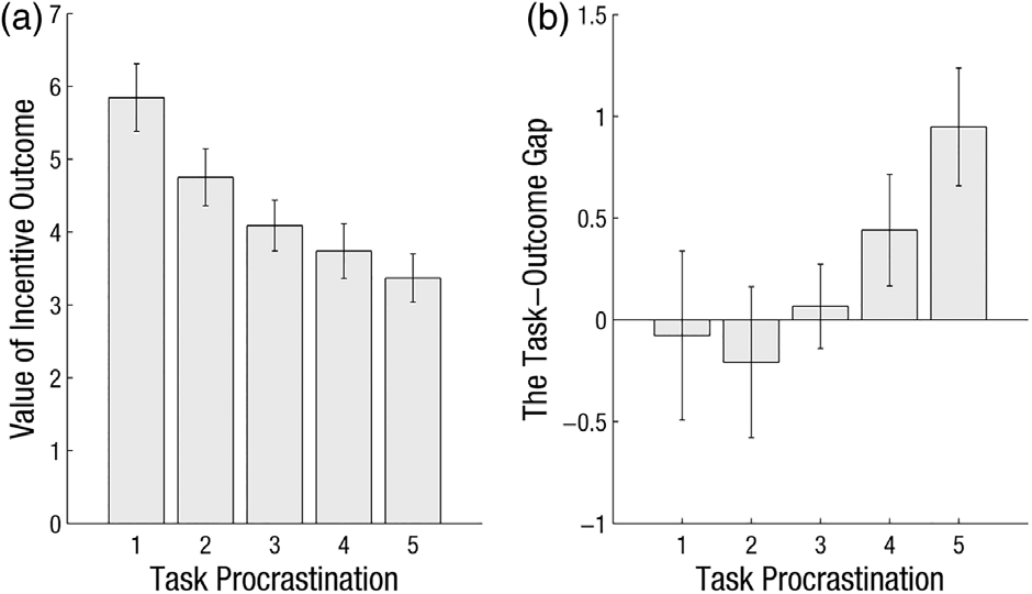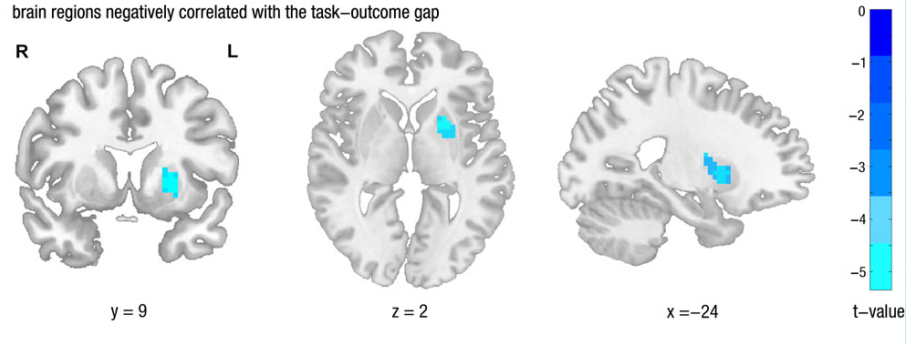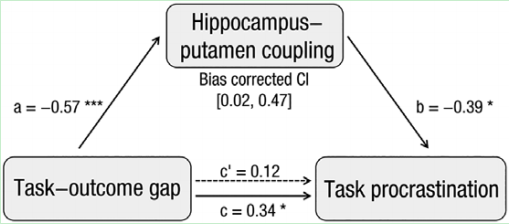任务与结果的不充分联结导致拖延行为:海马与壳核功能连接的作用
人们执行任务通常是为了得到完成任务后的结果,比如通过完成任务得到潜在的奖赏或者避免可能的惩罚。这些任务的结果能够激励任务的完成,结果的作用越强(奖赏越大或者惩罚越大)任务拖延的可能就越小。因此任务与结果联结紧密对促进任务的执行十分重要。
近日,冯廷勇教授团队在著名人脑功能成像学术期刊Human Brain Mapping上发表题为“Insufficient task-outcome association promotes task procrastination through a decrease of hippocampal–striatal interaction”的学术论文,该研究发现无法将任务与其能够产生的结果联系在一起会导致更多的拖延行为。
结果显示,结果价值越高拖延行为越少,而任务与结果的联结越弱任务的拖延行为就越多(图1)。在神经层面上,任务与结果的联结越弱(任务与结果的间隔越大),负责表征结果价值的壳核的活动就越弱(图2)。并且任务与结果的联结对拖延的影响是通过海马与壳核的功能连接(hippocampus-putamen coupling)来实现的(图3)。这以结果表明,不充分的任务与结果联结通过海马与壳核的功能连接引起拖延行为。由此可见,促使人们建立更强的任务与结果的联结能够有效地减少拖延行为。具体而言,预期想象任务的远期奖赏和意义或者当完成任务的小阶段时对自己进行奖励都能够帮助任务结果联结的建立。

图1:(a) 任务结果的价值越低拖延行为越严重。(b) 任务与结果联结越弱(较高的任务和结果间隔)拖延越严重。

图2:任务与结果的联结越弱(任务结果的间隔越大)壳核(putamen)的脑活动越弱。

图3:海马与壳核的功能连接中介了任务结果联结对拖延行为的影响。
论文的第一作者为西南大学在读博士生张顺民,冯廷勇教授为通讯作者。该研究得到国家自然科学基金面上项目(SWU1509392)和重庆市研究生创新项目的资助(CYB18112)。
文章索引
Zhang S, Becker B, Chen Q, Feng T. Insufficient task-outcome association promotes task procrastination through a decrease of hippocampal–striatal interaction. Human Brain Mapping. 2018;1–11.
DOI: https://doi.org/10.1002/hbm.24397
https://onlinelibrary.wiley.com/doi/abs/10.1002/hbm.24397
原文摘要
Theories on procrastination propose that associating tasks with higher valued incentive outcomes
results in less task procrastination. However, it remains unknown how representation of incentive
outcomes and task-outcome association are mediated by the human brain. Using event-related
functional magnetic resonance imaging, we scanned human participants while they were thinking
about both tasks and the incentive outcomes each task can yield in an unconstrained way. Results
showed that tasks that are more likely to be procrastinated are associated with less value in incentive outcomes. Interestingly, procrastination was more likely if it was more difficult for participants to associate a task with its valued incentives when thinking about the task (i.e., the decreased taskoutcome association). On the neural level, higher value of rewarding outcomes was correlated with increased putamen activations, which further negatively predicted task procrastination. On the other hand, when participants were associating tasks with the incentive outcomes, the decreasing taskoutcome association corresponded to decreasing activation in putamen, and a decreasing hippocampus-putamen coupling which further mediated the effect of the insufficient task-outcome association on procrastination. In particular, the current findings show that procrastination is more likely when people are less able to associate tasks with highly valued incentives, which is accompanied by reduced hippocampal–striatal interactions during task construction.





